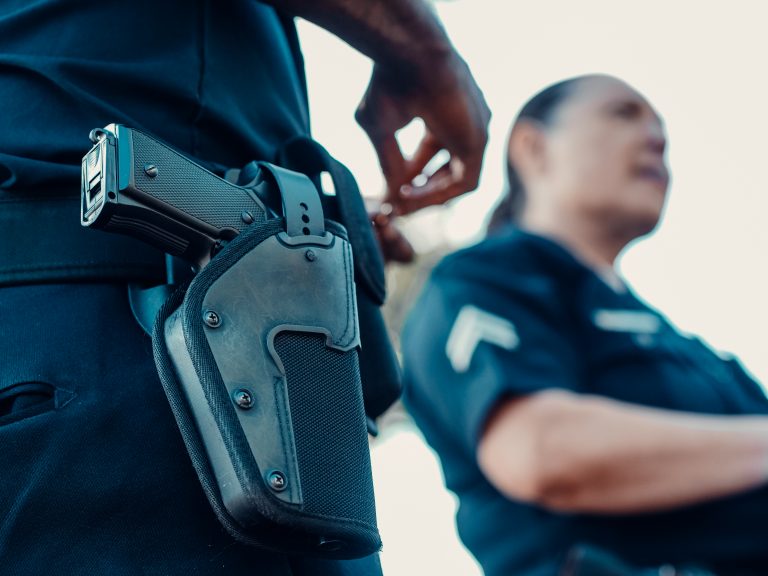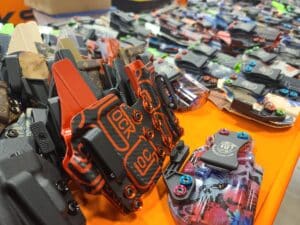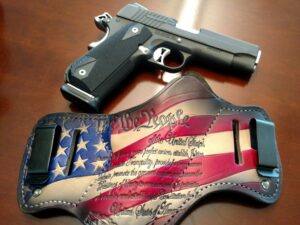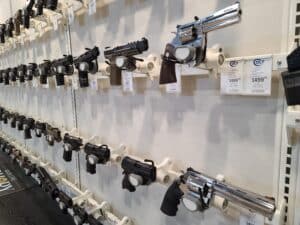A private gun buyback event hosted by gun-control activists may have violated New Mexico’s gun laws.
San Juan County Sheriff R. Shane Ferrari (R.) announced on Monday that his office was launching a formal investigation into New Mexicans to Prevent Gun Violence (NMPGV). He said he is looking to determine if it was illegal under state law for the group to exchange gift cards for unwanted firearms without first conducting a background check.
“I want to inform you that I am investigating San Juan County citizens’ complaints on New Mexicans to Prevent Gun Violence’s gun buyback program not complying with New Mexico State Law 30-7-7.1 ‘Unlawful sale of a firearm without a background check,'” Ferrari said in a Facebook post.
The incident is another example of gun-control advocates and even reporters accidentally running afoul of gun laws, often in an effort to show laws are too lax. In 2012, NBC News anchor David Gregory was nearly arrested for possessing a 30-round magazine during a segment where he questioned why they weren’t banned despite being in a jurisdiction where they were. In 2016, producers of a Katie Couric documentary that advocated for stricter gun laws were accused of breaking federal law by purchasing handguns across state lines in a private sale. Later that year, a CBS News correspondent was reported to the Bureau of Alcohol, Tobacco, Firearms, and Explosives (ATF) by a licensed gun dealer after she misled them about why she was buying a gun during an undercover segment.
The investigation comes after NMPGV conducted a private door-to-door gun buyback event in Farmington, New Mexico last weekend. The group initially planned to host an official buyback in partnership with the City of Farmington before city officials canceled it last Thursday in the face of public backlash. NMPGV decided to proceed with collecting firearms from some residents in an informal private buyback. That decision may make the group criminally liable under a gun law it helped pass and still champions.
Signed into law by New Mexico Governor Michelle Lujan Grisham (D.) in 2019, the state’s universal background check statute requires a federal background check to be conducted on any transfer of ownership of a firearm, whether commercial or private. Only law enforcement, valid federal firearms licensees (FFLs), and transfers between immediate family members are exempt.
Sheriff Ferrari said those narrow exemptions are what drew his attention to the potential illegality of the group’s event.
“Reviewing the law, I do not see where they are exempt from having to undergo a background check and are required to like anyone else,” he said. “A sale is taking place (gift cards $100 and up), it is advertised as a purchase, and called a ‘buy back.'”
NMPGV did not respond to The Reload’s request for comment. However, the group criticized the San Juan County Sheriff’s Office investigation on its social media accounts.
“It is tragic to see Sheriff Ferrari care more about 9 destroyed guns than the safety of his community from gun violence,” the group posted on X.
The group also claimed that its buyback procedures don’t meet the legal definition of a firearms transfer because the group “dismantles” the firearms it receives.
“We have been doing this for years,” NMPGV wrote in a separate post. “Often, police give people our phone number when they want to turn in an unwanted firearm. This doesn’t violate any background check laws as there is no transfer of firearms. We simply dismantle them. All that is left is wood and metal.”
But how the group dismantled the firearms it collected also drew scrutiny from Ferrari. NMPGV posted a photo of several long guns the group claims were obtained during the buyback event and appear to be sawed in half. Sheriff Ferrari, who also criticized the general idea of gun buybacks, raised the possibility that the guns were deactivated improperly and could violate federal law.
“I am also aware of photos shared by ‘New Mexicans to Prevent Gun Violence’ posting firearms that may not have been properly destroyed according to federal law and were obtained in San Juan County,” he said. “I will be looking into the matter.”
The ATF sets specific guidelines for how a gun must be dismantled to be considered destroyed and no longer a regulated firearm. Those guidelines include a minimum of three separate cuts completely severing the gun in “critical locations,” such as the barrel mounting area and fire-control-component mounting area. An improperly destroyed long gun that has only been cut at the barrel but leaves all other critical components intact, for instance, could be considered an illegal, unregistered short-barreled rifle in the eyes of the ATF.
However, federal prosecutions for improperly deactivating firearms are rare.
Sheriff Ferrari said he has forwarded information about the private buyback to state officials and is waiting to hear more on their legality.
“I’m awaiting the District Attorney and the Attorney General’s opinion on whether ‘New Mexicans to Prevent Gun Violences’ gun buyback program is operating lawfully and if law enforcement participation is following proper disposition of abandoned/ unclaimed property,” he wrote. “I’ll let you know.”






